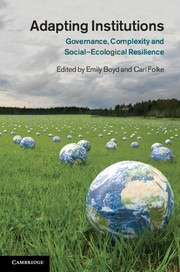Book contents
- Frontmatter
- Contents
- Illustrations
- Contributors
- Foreword
- Acknowledgements
- Acronyms and abbreviations
- 1 Adapting institutions, adaptive governance and complexity: an introduction
- Part I Adapting local institutions, networks, leadership and learning
- Part II Adapting and governing public institutions for uncertainty and complexity
- 6 Adaptive capacity and the ecostate
- 7 Food systems and adaptive governance: food crisis in Niger
- 8 Public–private partnerships in the provision of environmental governance: a case of disaster management
- Part III Adapting multi-level institutions to environmental crisis
- Index
- References
8 - Public–private partnerships in the provision of environmental governance: a case of disaster management
from Part II - Adapting and governing public institutions for uncertainty and complexity
Published online by Cambridge University Press: 05 November 2011
- Frontmatter
- Contents
- Illustrations
- Contributors
- Foreword
- Acknowledgements
- Acronyms and abbreviations
- 1 Adapting institutions, adaptive governance and complexity: an introduction
- Part I Adapting local institutions, networks, leadership and learning
- Part II Adapting and governing public institutions for uncertainty and complexity
- 6 Adaptive capacity and the ecostate
- 7 Food systems and adaptive governance: food crisis in Niger
- 8 Public–private partnerships in the provision of environmental governance: a case of disaster management
- Part III Adapting multi-level institutions to environmental crisis
- Index
- References
Summary
Introduction
Disaster planning is an activity most often performed by the state, through which disaster risk reduction is provided as a public good. State institutions manage this role with varying degrees of success. State provision of disaster risk reduction occurs when there is financial and political commitment to risk reduction, effective institutional structures and the alignment of political interests with those of powerful stakeholder groups. This chapter analyses a novel approach to disaster risk reduction – the use of a public–private partnership – and shows how adaptive governance can work in practice. Specifically, the chapter analyses the role of public and private responsibility in the provision of disaster mitigation, early warning systems, disaster response and post-impact recovery. This is achieved through a review of the emergence and transformation of the Cayman Islands’ National Hurricane Committee (NHC). The NHC is a novel hybrid institution that emerged through spontaneous collective action by various members of Cayman Islands society, some of whom were civil servants. The NHC is now an official public–social–private partnership that uses relational contracting transactions, hierarchical management relationships and recurrent contractual transactions to prepare the Cayman Islands for storms and manage the islands’ recovery in a state of emergency. This chapter reveals that public–private partnerships can provide effective governance structures for weather-risk management, if they exhibit the features commonly associated with adaptive governance, that is, they are participatory and deliberative, they build trust, they are multi-layered, they link knowledge, action and hazard context, and they are accountable. However, such public–private partnerships need to be carefully crafted and delivered to ensure that the distribution of costs and benefits from their existence is not captured by a small group of powerful individuals.
The term public–private partnership (PPP) describes a range of initiatives that bring together the public and private sectors for long-term partnerships of mutual benefit. PPPs have been described as ‘an institutionalised form of cooperation of public and private actors who, on the basis of their own indigenous objectives, work together towards a joint target, in which both parties accept investment risks on the basis of a predetermined distribution of revenues and costs’ (Nijkamp et al. 2002).
- Type
- Chapter
- Information
- Adapting InstitutionsGovernance, Complexity and Social-Ecological Resilience, pp. 171 - 190Publisher: Cambridge University PressPrint publication year: 2011
References
- 5
- Cited by



